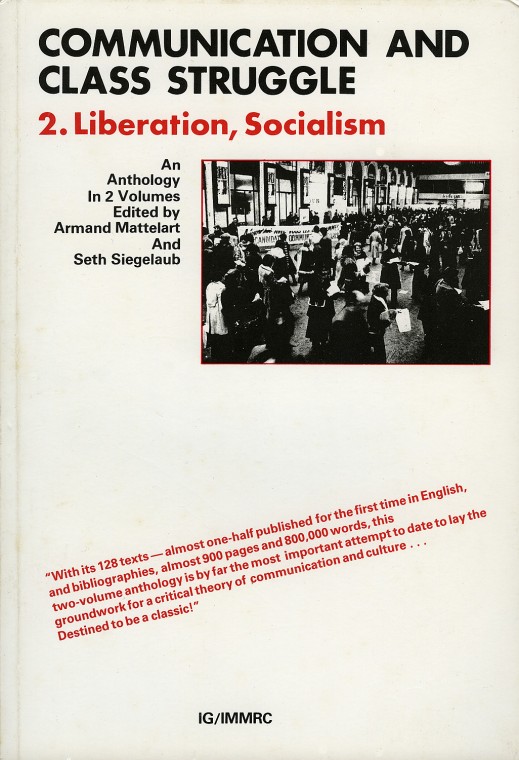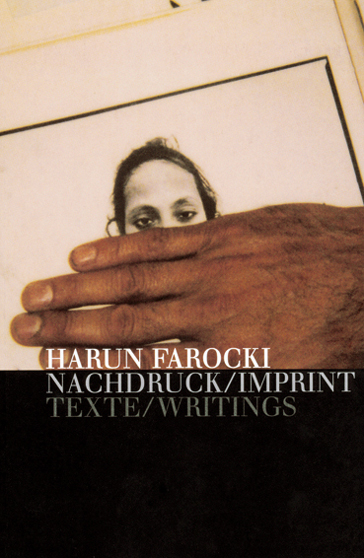Armand Mattelart, Seth Siegelaub (eds.): Communication and Class Struggle, 2: Liberation, Socialism (1983)
Filed under book | Tags: · aesthetics, communication, communism, everyday, information, left, life, machine, marxism, mass media, media, political economy, politics, socialism, theory

“Communication and Class Struggle, a two-volume work, is the first general marxist anthology of writings on communication, information and culture. Its purpose is to analyse the relationship between the practice and theory of communication and their development with the context of class struggle. Armand Mattelart and Seth Siegelaub, the editors, have selected more 128 essential marxist and progressive texts originating in over 50 countries and written since the mid-nineteenth century to explain three interrelated phenomena: (1) how basic social, economic and cultural processes condition communication; (2) how bourgeois communication practice and theory have developed as part of the capitalistic mode of production; and (3) how in the struggle against exploitation and oppression, the popular and working classes have developed their own communication practice and theory, liberated mode of communication, culture and daily life.
The second volume provides an analysis of the development of popular and working-class communication and culture, its theory and practice under different political-social and historical conditions, and its contemporary expression. The book contains 64 texts. 38 are published for the first time in English, and some texts appear for the first time in any language. In addition, it includes a 650-entry bibliography.” (from the back cover)
Publisher International General, New York, and International Mass Media Research Center (IMMRC), Bagnolet, 1983
ISBN 0884770192, 9780884770190
438 pages
Review: Dallas W. Smythe (Journal of Communication 1985, p 218ff).
PDF (40 MB, updated to OCR’d version on 2017-10-30 via Memory of the World)
See also Volume 1.
Harun Farocki: Nachdruck / Imprint – Texte / Writings (2001) [DE/EN]
Filed under book | Tags: · aesthetics, film, film criticism, film theory, image, media

“This book brings together a selection of writings produced by Harun Farocki between 1977 and 1999. They provide an insight into Farocki’s filmic work and its underlying querying of the status, production, and perception of images conveyed technically and through media. As a critical observer of political and cultural events, Farocki reveals the images’ hidden content in his films and writings, freeing them from the detritus of the encoding with which they have been covered in the course of their development, their use in various media and subsequent reception. Farocki’s deconstructive reflections establish new standards not only for the aesthetics of film but for visual art as well.”
Published on the occasion of the retrospective exhibition of Harun Farocki at the Westfälischer Kunstverein and Filmclub Münster, June-August 2001.
Edited by Susanne Gänsheimer and Nicolaus Schafhausen
Introduction by Volker Pantenburg
English translation by Laurent Faasch-Ibrahim
Publisher Vorwerk 8, Berlin, and Lukas & Sternberg, New York, 2001
ISBN 393091641X, 9783930916412
323 pages
via niccadena
PDF (45 MB)
Comment (1)Luciana Parisi: Contagious Architecture: Computation, Aesthetics, and Space (2013)
Filed under book | Tags: · abstraction, aesthetics, algorithm, architecture, cognition, computation, computing, cybernetics, design, evolution, feedback, infinity, information, interaction design, knowledge, media, metaphysics, networks, neural networks, philosophy, processing, randomness, sensors, software, space, temporality, time, topology, variation

“In Contagious Architecture, Luciana Parisi offers a philosophical inquiry into the status of the algorithm in architectural and interaction design. Her thesis is that algorithmic computation is not simply an abstract mathematical tool but constitutes a mode of thought in its own right, in that its operation extends into forms of abstraction that lie beyond direct human cognition and control. These include modes of infinity, contingency, and indeterminacy, as well as incomputable quantities underlying the iterative process of algorithmic processing.
The main philosophical source for the project is Alfred North Whitehead, whose process philosophy is specifically designed to provide a vocabulary for “modes of thought” exhibiting various degrees of autonomy from human agency even as they are mobilized by it. Because algorithmic processing lies at the heart of the design practices now reshaping our world—from the physical spaces of our built environment to the networked spaces of digital culture—the nature of algorithmic thought is a topic of pressing importance that reraises questions of control and, ultimately, power. Contagious Architecture revisits cybernetic theories of control and information theory’s notion of the incomputable in light of this rethinking of the role of algorithmic thought. Informed by recent debates in political and cultural theory around the changing landscape of power, it links the nature of abstraction to a new theory of power adequate to the complexities of the digital world.”
Publisher MIT Press, 2013
Technologies of Lived Abstraction series
ISBN 0262018632, 9780262018630
392 pages
For a New Computational Aesthetics: Algorithmic Environments as Actual Objects lecture by Parisi (2012, video, 72 min).
Reviews: Lecomte (Mute, 2013), Ikoniadou (Computational Culture, 2014).
PDF (24 MB, updated o 2021-10-28)
Comments (2)
